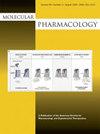The M3 muscarinic acetylcholine receptor can signal through multiple G protein families
IF 3
3区 医学
Q2 PHARMACOLOGY & PHARMACY
引用次数: 0
Abstract
The M3 muscarinic acetylcholine receptor (M3R) is a G protein coupled receptor (GPCR) that regulates important physiological processes including vascular tone, bronchoconstriction, and insulin secretion. It is expressed on a wide variety of cell types, including pancreatic beta, smooth muscle, neuronal, and immune cells. Agonist binding to the M3R is thought to initiate intracellular signaling events primarily through the heterotrimeric G protein Gq. However, reports differ on the ability of M3R to couple to other G proteins beyond Gq. Using members from the four primary G protein families (Gq, Gi, Gs, and G13) in radioligand binding, GTP turnover experiments, and cellular signaling assays including live cell G protein dissociation and second messenger assessment of cAMP and inositol trisphosphate, we show that other G protein families, particularly Gi and Gs, can also interact with the human M3R. We further show that these interactions are productive as assessed by amplification of classical second messenger signaling events. Our findings demonstrate that the M3R is more promiscuous with respect to G protein interactions than previously appreciated.M3 肌肽乙酰胆碱受体可通过多个 G 蛋白家族发出信号
M3 肌肽乙酰胆碱受体(M3R)是一种 G 蛋白偶联受体(GPCR),可调节血管张力、支气管收缩和胰岛素分泌等重要生理过程。它表达于多种类型的细胞,包括胰岛β细胞、平滑肌细胞、神经细胞和免疫细胞。激动剂与 M3R 的结合被认为主要是通过异三聚 G 蛋白 Gq 启动细胞内信号传导。然而,关于 M3R 与 Gq 以外的其他 G 蛋白的耦合能力的报道却不尽相同。我们利用四个主要 G 蛋白家族(Gq、Gi、Gs 和 G13)的成员进行了放射性配体结合、GTP 转化实验和细胞信号测定(包括活细胞 G 蛋白解离和 cAMP 和三磷酸肌醇的第二信使评估),结果表明其他 G 蛋白家族,尤其是 Gi 和 Gs,也能与人类 M3R 相互作用。我们进一步表明,通过对经典第二信使信号事件的放大评估,这些相互作用是富有成效的。我们的研究结果表明,M3R 在 G 蛋白相互作用方面比以前所认识到的更加杂乱无章。
本文章由计算机程序翻译,如有差异,请以英文原文为准。
求助全文
约1分钟内获得全文
求助全文
来源期刊

Molecular Pharmacology
医学-药学
CiteScore
7.20
自引率
2.80%
发文量
50
审稿时长
3-6 weeks
期刊介绍:
Molecular Pharmacology publishes findings derived from the application of innovative structural biology, biochemistry, biophysics, physiology, genetics, and molecular biology to basic pharmacological problems that provide mechanistic insights that are broadly important for the fields of pharmacology and toxicology. Relevant topics include:
Molecular Signaling / Mechanism of Drug Action
Chemical Biology / Drug Discovery
Structure of Drug-Receptor Complex
Systems Analysis of Drug Action
Drug Transport / Metabolism
 求助内容:
求助内容: 应助结果提醒方式:
应助结果提醒方式:


